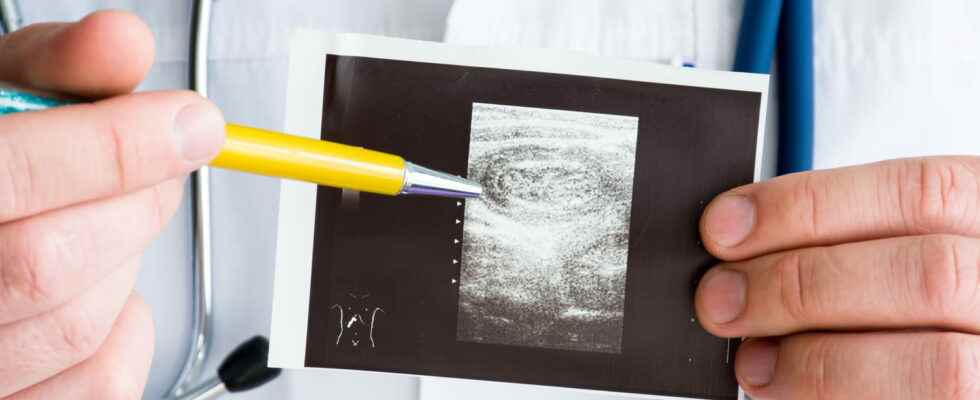Sometimes called “intestinal intussusception”, intussusception refers to the introduction of one part of the intestine into the other. It mainly affects young children and can lead to bowel obstruction. Explanations.
An intestinal intussusception is a pathology affecting more children. “It occurs when a portion of the intestine turns around and enters another part of the intestine, located lower down (a bit like the finger of a glove turned upside down). In the majority of cases, intussusception occurs at the junction between the small intestine and the colon“, explains Dr. Monique Quillard, general practitioner and pediatrician. When acute intussusception occurs, it can lead to bowel obstruction. This type of manifestation occurs statistically most often in babies between 3 months and 3 years, in good health apart from other health problems, and more often in boys. It appears more often on the autumn-winter period and in the context of recent infection.
Acute intussusception mainly affects young children. “In older children and adults, it can become chronic: it regresses naturally before occurring again, by episodes“, says Dr. Quillard.
This disease is characterized by severe abdominal painof the vomiting and one transit stop. It’s a medical emergency because it can lead to bowel obstruction. “In the baby, crying, crying, paleness, discomfort and restlessness may last a few minutes, disappear and then reappear a few minutes later when so far everything was finesays our expert. The intervals between each crisis are getting shorter and shorter. At the same time, the baby refuses to eat, he vomits, gradually shows signs of anorexia and it is not uncommon to find blood in his stools“. This inflammation is an emergency in the baby, it is serious even fatal. In older children and adults, these are mainly symptoms of bowel obstruction (constipation, severe abdominal pain and vomiting).
Acute intussusception is idiopathic, meaning there is no no proven causes. It often occurs in a healthy child. Sometimes, a viral or ENT infection is found upstream and would have caused the development of lymph nodes on the mesentery, causing this intussusception. In April 2015, 7 cases of acute intussusception were found after vaccination with Rotarix and Rotateq, against gastroenteritis due to rotavirus according to the French National Authority for Health. When it is chronic, it is often secondary to another pathology: polyp, malignant tumor, lymphoma, purpura, cystic fibrosis, etc.
It is an emergency that requires hospital treatment.
“Intussusception should be considered in any child between 3 months and 3 years with acute abdominal pain“, notes Dr. Quillard. The diagnosis of acute intussusception is essentially based on medical imaging. “Abdominal ultrasound is the first-line examination. especially since it allowsexclude other pathologies such as acute appendicitis“, remarks the pediatrician. Sometimes, a enema (injection of a solution) or pneumatic (air injection) anally under radiological control confirms the diagnosis. These examinations have the advantage of being able to also treat intussusception by allowing the segment of the intestine to be replaced.
It is essential to reduce the intussusception as quickly as possible. the opaque or pneumatic enema turns out a treatment effective in 90% of cases. Indeed, the invaginated part will gradually be put back in place by the injection pressure of the liquid. Nevertheless, the patient must continue to be monitored for the next 24 hours in case this treatment remains insufficient. In this case, surgery is necessary, sometimes with the removal of part of the intestine.
Yes, the prognosis is excellent when intussusception is treated early. In the absence of rapid treatment, the risk is necrosis of the invaginated part, then perforation and septic shock.
Acute intussusception is a pathology that is not predictable and therefore impossible to prevent.
Source: Epidemiology of acute intussusception in children under 1 year. Preliminary results of the Epistudy study. French Public Health. 2012
Thanks to Dr Monique Quillard, general practitioner and pediatrician.
